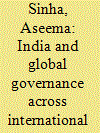| Srl | Item |
| 1 |
ID:
185095


|
|
|
|
|
| Summary/Abstract |
India’s rising power and status within a variety of global institutions is well explained with the help of an inside-out approach, with a focus on India’s domestic compulsions and strategies. This special section of four articles in Contemporary South Asia deepens this inside-out analysis, combining it with an outside-in approach to global institutions which explore how the global regime in question shapes and interacts with domestic impulses and dilemmas. The four papers explore India’s approach and actions across a divergent set of global institutions such as the IMF, the WHO, and maritime governance in a regional context, showing how the institutional and geopolitical context matters to understanding India’s diverse actions and strategies. These articles also explore the evolving process of compliance and implementation within each specific global institutional context. Such a comparative approach allows us to understand how the specific institutional design of the relevant organization or the structure of the global regime affects India. In this introduction to the special section, I outline the advantages of an interactive, comparative approach, exploring India’s varying actions across a variety of issue areas and global contexts. Such a variegated and differential analysis across global regimes is valuable for a more complete and differentiated analysis of India’s rise.
|
|
|
|
|
|
|
|
|
|
|
|
|
|
|
|
| 2 |
ID:
157689


|
|
|
|
|
| Summary/Abstract |
The article addresses post-communist transformations in Central and Eastern Europe through the conceptual apparatus of Luhmann’s social systems theory, which sees increasing functional differentiation in terms of subsystems’ autonomous autopoietic self-organisation as the key aspect of these transformations. By applying fuzzy-set analysis, it is demonstrated that a radical break with the former communist regime is sufficient for the self-organisation of the political subsystem, and necessary for the market reforms that are sufficient for the self-organisation of the economic subsystem. Moreover, the self-organisation of both functional subsystems has clearly contributed to development in terms of an increase in the Human Development Index after 1990.
|
|
|
|
|
|
|
|
|
|
|
|
|
|
|
|